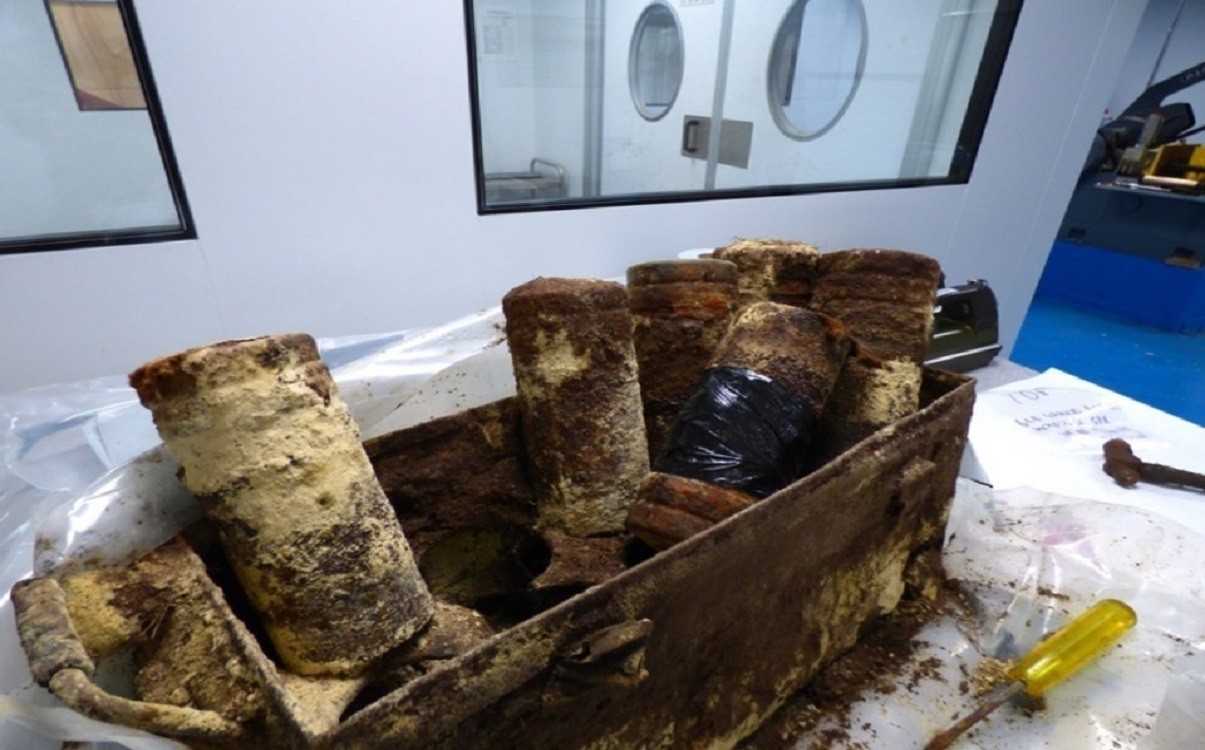3 British Citizens jailed for dumping mustard gas bombs. Mustard gas is extremely toxic and deadly
A trio of wartime memorabilia hunters have received jail sentences for dumping WWII mustard gas bombs in a Lincolnshire lake – making them the first in the country to be sentenced for possession of a chemical weapon.
Martyn Tasker (40) was jailed for 5 years for possession of firearms, plus 16 months’ concurrent sentence for possession of a chemical weapon. His wife Michaela Tasker (32) and friend Stuart Holmes (50) were both handed a 12-month jail sentence suspended for two years for possession of a chemical weapon.
They all pleaded guilty to breaching environmental laws by dumping hazardous material in the lake in addition to the chemical weapons charge.
Holmes also pleaded guilty to dumping a substance likely to harm human health or pollute the environment.
High Court Judge the Honourable Mr Justice Jeremy Baker in Nottingham Crown Court today passed sentence on the joint prosecution by the Environment Agency and the Crown Prosecution Service.

During sentencing, he highlighted that the trio’s acts had ‘huge and wide-ranging consequences’, sparking the largest multi-agency response of its kind – and the situation only came to light when two of the three sought medical help for burns and trouble breathing.
The court heard that in September 2017, the Taskers came across wartime memorabilia in Roughton Woods, near Woodhall Spa – land which was historically requisitioned by the MoD for military training – and dug up a half-buried box of mustard gas bombs.
They messaged a friend who used to repair weapons in the Territorial Army to ask what they’d found, but didn’t get an immediate identification.
Ten days later, the pair returned with Mr Holmes and uncovered a total of 16 canisters and three earthenware bottles.
One bottle was prised open – exposing what Mr Tasker called ‘really smelly oil’ inside – before his friend texted, confirmed the containers were full of mustard gas, and advised alerting the authorities.
But Holmes had already poured the three bottles of mustard gas onto the ground so he could take the empty bottles home with him, along with 10 unopened canisters. The group left the other six canisters, but didn’t report their find – despite knowing what a dangerous substance they’d uncovered.
Later that day, they decided to dump the canisters in Stixwould Lake, where Holmes worked. They secretly took a dinghy, rowed out into the lake, and left the containers to sink to the bottom, before burning their clothes.
The next day, Martyn Tasker sought treatment for blisters on his forearms and soon after, Michaela Tasker was treated for breathing difficulties.
Only then did the pair alert the police – but they lied about the circumstances and still didn’t tell officers about the bombs they dumped in the lake.
But it wasn’t long until inconsistencies emerged from their stories and all three were arrested.
Authorities then launched a major operation to secure the woods, lake, and suspects’ homes, and to recover the hazardous chemical.
In what has since been hailed the biggest operation of its kind, Lincolnshire Police led more than two dozen organisations including the Environment Agency, emergency services, and the Army, in an 11-day response.
It saw roads closed, drones deployed, safety cordons put in place, and at least one home evacuated while teams worked around the clock to tackle the tactical challenges of safely removing the bombs from the lake while keeping themselves, and nearby residents, safe.
Environment Agency sonar equipment usually used for fish surveys finally determined the bombs’ location in the lake before Royal Navy divers were sent in to safely retrieve them.

The bombs were immediately transferred to the specialist defence science and technology lab in Porton Down. There, testing confirmed that the containers were still sealed and had not leaked.
Everyone involved risked exposure and nasty side effects including burns, blisters, respiratory damage, vomiting and diarrhoea. Multiple public meetings were held to address concerned local residents.
Following the sentencing, Ben Thornely, Incident Management Lead at the Environment Agency, said:
“Mustard gas is extremely toxic, so dumping it in a lake near people’s homes and in a popular woodland enjoyed by Scouts and dog-walkers was appallingly dangerous.
Luckily the old, corroded containers didn’t leak and were safely disposed of by professionals who showed bravery, ingenuity and collaboration to keep people safe.
This incident was entirely unique, so it’s satisfying the judge recognized the grave threat posed and we hope this sentence sends a clear message – we won’t hesitate to take action against those who so carelessly put people and our precious environment at risk.









